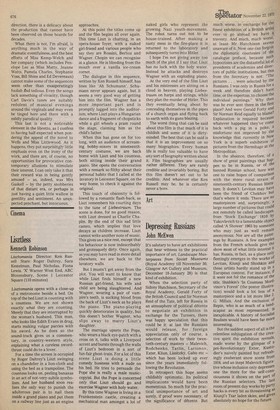, Cinema
Lisztless Kenneth Robinson
Lisztomania Director: Ken Russell Stars: Roger Daltrey, Sara Kestelman, Paul Nicholas, Fiona Lewis. 'X' Warner West End, ABC Bloomsbury, Scene I Leicester Square (110 minutes) Lisztomania opens with a close-up of a metronome beside a bed. On top of the bed Liszt is counting with a countess. We are not shown exactly what they are counting. Merely that they are interrupted by the woman's husband. This man, who looks like Edith Evans in drag, starts making vulgar parries with his sword. As he does so the sound-track gives us a commentary, in country-western style, explaining what a careless swordthrust could do to a lover.
For a time the screen is occupied by Roger Daltrey's Liszt swinging on a chandelier in a lion-cloth and using the bed as a trampoline. The countess looks on, peeling bananas in an act of not-very-subtle symbolism. And her husband soon realises the only way to punish the adulterous pair is to nail them inside a grand piano and put them on a railway line just as an engine approaches.
At this point the titles come up and the film begins all over again. This time Liszt is chatting, in an opera-house foyer, with a naked girl-friend and various people who say they are Rossini, Berlioz and Wagner. Chopin we can recognise at a glance. He is bleeding from the mouth over a vanilla ice-cream cornet.
The dialogue in this sequence, written by Ken Russell himself, has lines like 'Ah Schumann'. Schumann never appears again, but it seems a very good way of getting him into the film. Wagner has a more important part and is promptly lugged into the auditorium, where Liszt plays a Hungarian dance and a fragment of chopsticks while a girl wheels a pram round the stage, claiming him as the child's father.
When this has gone on for too long, with an audience of screaming bobby-soxers in nineteenthcentury costume, we are back home with Liszt and his countess, both sitting inside their grand piano. She opens the conversation with a remark so filthy about their personal habits that I called at the lavatory in Leicester Square, on the way home, to check it against the original.
This touch of obscenity is followed by a romantic flash-back, as Liszt remembers his courting days to the tune of Liebestraum. The scene is done, for no good reason, with Liszt dressed as Charlie Chaplin. By the end of this sad little cameo, which implies that love ' decays as children increase, Liszt cannot write another note of music. This gives us a nice rest, except that his behaviour is now indescribably and grotesquely dirty. Once again, as you may have read in more detail elsewhere, we are back to the lavatory walls.
But I mustn't get away from the plot. You will want to know that while Liszt finds himself a new Russian girl-friend, his wife and child are being slaughtered. And Wagner, wearing a pair of vampire's teeth, is sucking blood from the back of Liszt's neck as he plays the piano. The piano-playing quickly deteriorates in quality, but this doesn't bother Wagner, who slips away to marry Liszt's daughter.
The marriage upsets the Pope, who wears a black eye-patch with a cross on it, talks with a Liverpool accent and bursts through the walls of Liszt's bedroom in a sort of fun-fair ghost-train. For a lot of this scene Liszt is doing a little comedy business with a nude on his bed. He tries to persuade the Pope she is really a male musiccopyist. But the Pope is concerned only that Liszt should go and exorcise Wagner with holy water.
By this time Wagner is living in a Frankenstein castle, creating a mechanical man amongst a lot of naked girls who represent the growing Nazi youth-movement. The robot turns out not to be house-trained. After making a nasty mess in the fire-place it is returned to the laboratory and subsequently turns into Hitler.
I hope I'm not giving away too much of the plot if I say that Liszt has no luck with the holy water. Instead he attacks and destroys Wagner with an exploding piano.
At the very end of the film Liszt and his mistresses are sitting on a cloud in heaven, playing Liebestraum on harps and strings, while they plan the murder of Hitler. This they eventually bring about by concealing themselves in the pipes of a church organ and flying back to earth with its guns blazing.
The worst thing that can be said about this film is that much of it is childish and some of it is dirtyminded. The best that can be said is that it is an improvement on so many biographies. Every human life is really too valuable to have any sort of biography written about it. Film biographies are usually rather different. They are rarely credible and invariably boring. But this film doesn't set out to be credible. And whatever else Ken Russell may be, he is certainly never a bore.
































 Previous page
Previous page